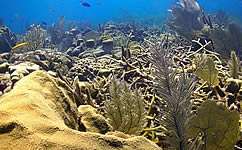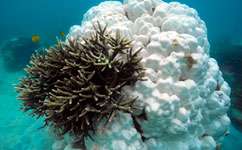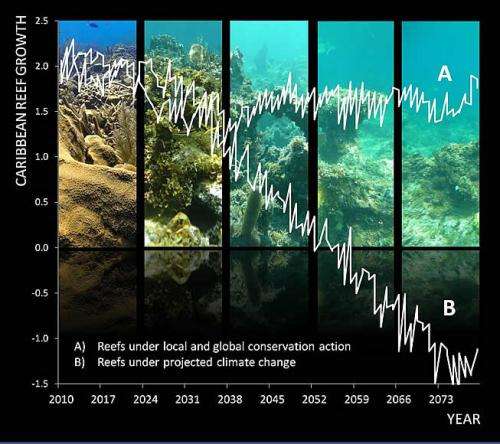Scientists call for global action on coral reefs

Urgent cuts in carbon emissions are needed if Caribbean coral reefs are to survive past the end of the century, scientists have warned.
A new paper, published in the journal Current Biology, says Caribbean reef growth is already much slower than it was 30 years ago. Its authors say that without serious action on climate change, the reefs may stop growing and begin to break down within the next 20-30 years.
'The balance between reef growth and reef erosion is changing as we alter the environment,' says Dr Emma Kennedy of the University of Exeter, who led the study.
'This means that increasingly, some reefs are breaking down faster than they can replace themselves – essentially they're being worn away.'
As corals grow they produce limestone skeletons which build up over time into vast reefs. They provide a natural breakwater and a complex three-dimensional habitat, making an ideal home for a vast array of marine species.
'Healthy reefs are the rainforests of the sea,' says Kennedy. 'They provide habitat for over a quarter of all marine species, including many colourful fish and corals.'
'They also provide a range of vital benefits to humanity, like food, jobs and protection from the sea. Globally, over half a billion people rely on reef services to some extent.'

In the Caribbean alone, coral reefs are thought to be worth US$3.1-4.6 billion every year. But serious local and global pressures are causing corals around the world to fall into ill health.
Locally, they're suffering from nutrient pollution, overfishing and an influx of reef-smothering sediments from coastal developments.
Pacific reefs have also fallen victim to plagues of coral-eating starfish, whose larvae thrive in nitrogen washed into the sea from farms on land. Australian authorities estimate that 35 per cent of the Great Barrier Reef's coral cover has been lost to crown-of-thorns starfish in the past 25 years. They're warning that a new outbreak could be on the way this year.
Carbon emissions pose a variety of dangers to corals. Rising sea levels threaten to leave them stranded in darker waters, starving them of the light they need to survive.
As the oceans absorb more carbon from the atmosphere, they are also becoming slightly more acidic, and less favourable to corals.
Perhaps most seriously, warming ocean temperatures are causing a breakdown in the vital give-and-take relationship between corals and the algae that live in their tissues. This leads to coral bleaching, where whole coral colonies become lighter in colour or completely white, and many go on to die.
Kennedy and her team used their own observations and information from more than 300 academic papers to build computer simulations of Caribbean reef growth and erosion.

Taking over 116 different factors into account, they were able to predict the effect of various conservation measures and climate scenarios on reef health.
They found that local policies and conservation measures, like protecting key species and preventing agricultural run-off, could buy reefs an extra decade or so. But the study suggests that it's going to take global action if Caribbean reefs are to survive beyond the end of the century.
'We're all responsible for looking after our planet to a certain extent, and as individuals we can help out by trying to reduce our carbon footprint in any way we can,' says Kennedy.
'But unless governments can work together at an international level, then our research suggests that the future looks grim for reefs.'
'Under business-as-usual climate scenarios we found Caribbean reefs eventually all degraded well before the end of the century. At the moment, we're still following this trajectory.'
More information: Kennedy EV, Perry CT, Halloran PR, Preito-Iglesias R, Schonberg CHL, Wisshak M, Form AU, Carricart-Ganivet JP, Fine M, Eakin CM, Mumby PJ, Avoiding Coral Reef Functional Collapse Requires Local and Global Action, 2013, Current Biology. DOI: dx.doi.org/10.1016/j.cub.2013.04.020
Journal information: Current Biology
Provided by PlanetEarth Online
This story is republished courtesy of Planet Earth online, a free, companion website to the award-winning magazine Planet Earth published and funded by the Natural Environment Research Council (NERC).


















